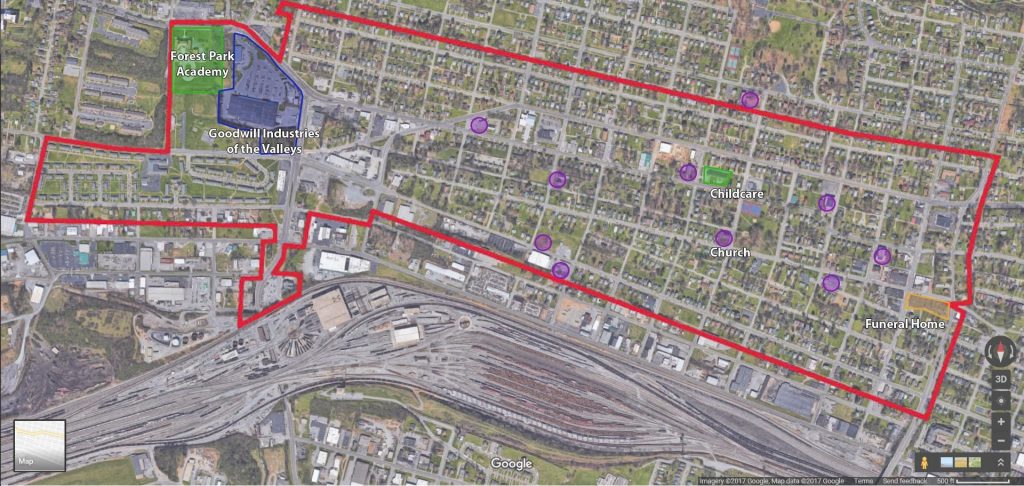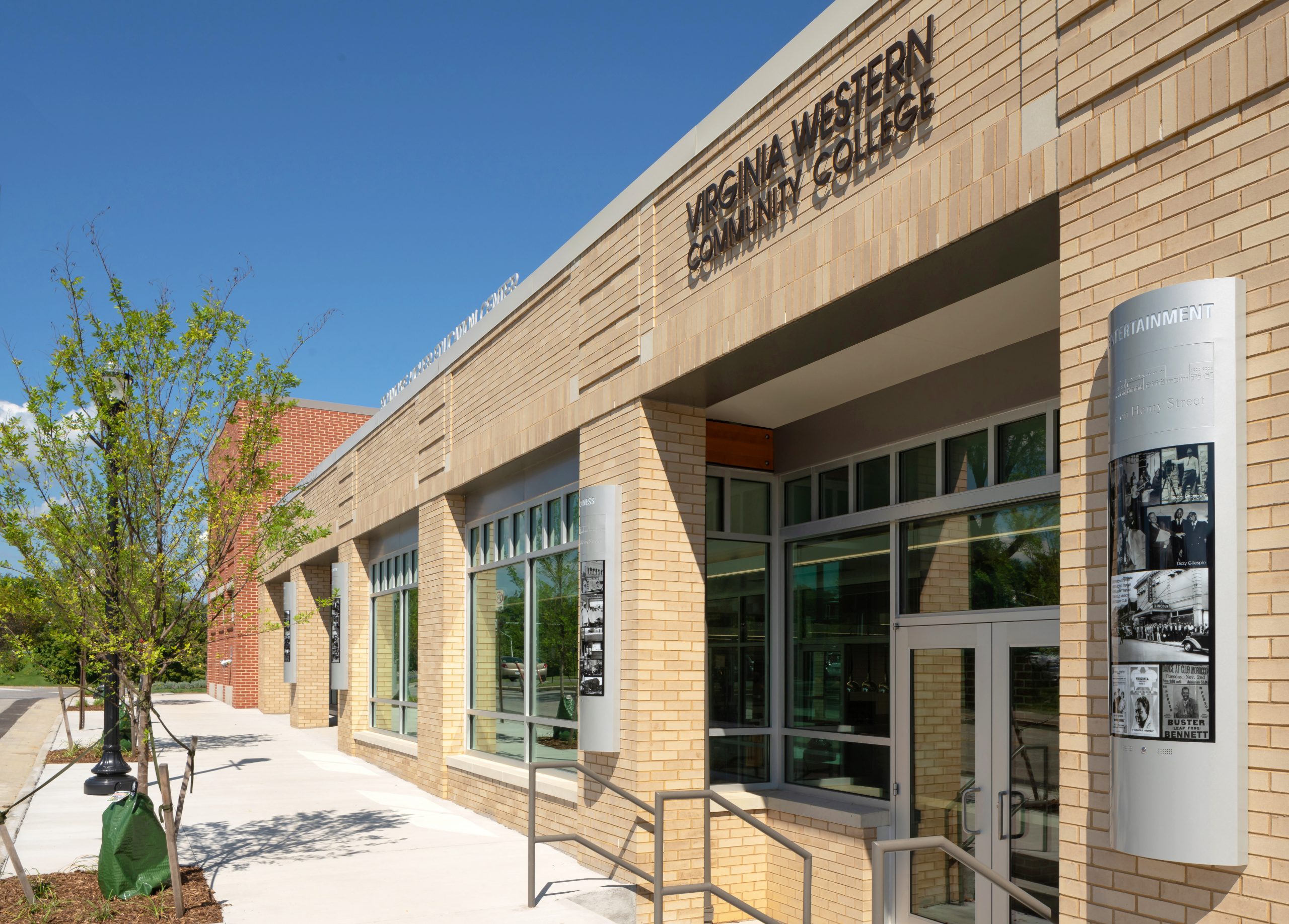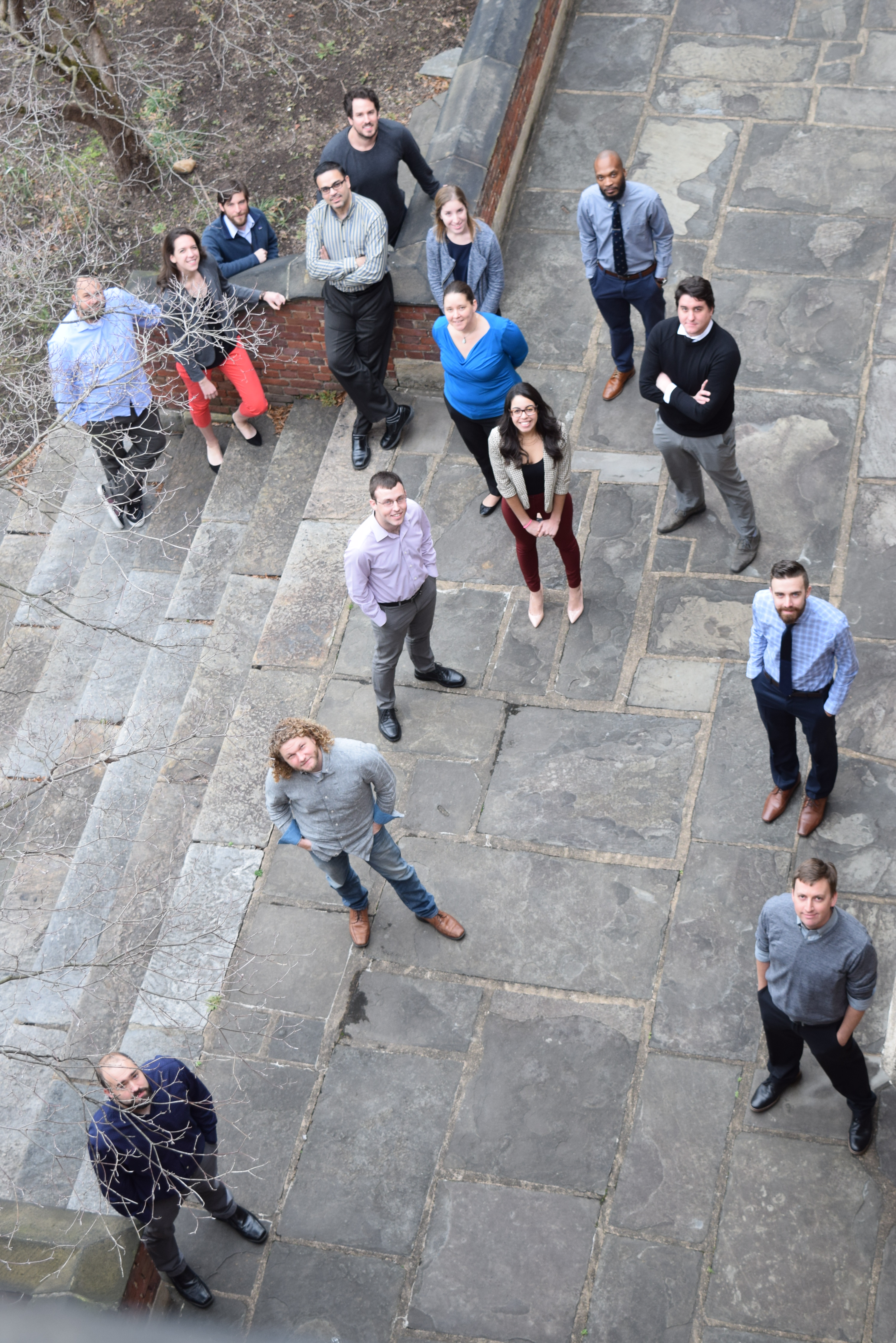On Nov. 4, 2022 the members of the 2022 class of Emerging Leaders in Architecture presented their project presentation at Architecture Exchange East. The project was focused on solutions for the Belmont-Fallon community in Roanoke.
Claude Moore Education Complex
The recently completed expansion to the Claude Moore Education Complex features three new state-of-the-art culinary teaching environments. This collaboration between the Roanoke Higher Education Authority and Virginia Western Community College allows the culinary school to exist outside of the VWCC campus, and in close proximity to a multitude of restaurants, commercial kitchens, and future employment opportunities for their graduates.
In addition to serving as an educational facility, the existing complex includes a cultural icon, the historic Strand Theatre. Once home to the offices of one of the first African American filmmakers Oscar Micheaux, the building has hosted many great artists and musical legends. The design team worked with the neighborhood to develop and incorporate historic markers and artwork to help document and share the community’s rich history.
Located along the Henry Street Historic District, the design team at Spectrum Design worked with representatives of the Gainsboro neighborhood to develop a series of back-lit historic markers that showcase the rich story of the once thriving business and cultural hub. Panels are broken out into categories that feature famous entertainers that performed in the theater as well as prominent businesses and restaurants that once fronted Henry Street. A push-button at each panel triggers an oral history recording featuring interviews with neighborhood residents.
With an addition that respects the past, the Claude Moore Complex now looks to define its future.
The Claude Moore Education Complex was recognized with an Award of Merit in the Contextual Design category in 2019.
About the Project
Architecture Firm: Spectrum Design, PC
Owner: Roanoke Higher Education Authority
Contractor: Avis Construction
Photographer: Boyd Pearman Photography
Project Size: 18,000 SF TOTAL
(8,200 SF ADDITION)
Project Cost: $4,419,875
ELA 2017 Class Project Announced
The 2017 Emerging Leaders in Architecture class will be focusing their work this year in the Melrose-Orange area of Roanoke, Virginia. While the scope of work is still to be determined, this area has been identified as a target area where entitlement funds from the U.S. Department of Housing and Urban Development (HUD) could be used. The City of Roanoke can use these annual funds to address any of three national objectives of HUD; benefiting persons of low to moderate income, eliminating slums and blighting influences, and urgent needs. Creation and preservation of affordable housing is also a goal of HUD that directs how these funds can be spent. Approximately $2.0 million in Community Development Block Grant (CDBG) and Home Investment Partnerships (HOME) funds are received from HUD each year to meet these objectives.
Annually, the City of Roanoke targets at least 51% of these funds into neighborhoods or blocks that qualify as having a majority of its residents as low to moderate income under HUD definitions. Generally, the city spends between 4 – 6 years in each target area. Previous target areas assisted include West End, Hurt Park, Gainsboro, and Southeast.
A map of the Melrose-Orange target area showing neighborhood institutions is shown below. The intent of targeting an area for the multi-year commitment of HUD funds is to encourage private investment and improve the sustainability of neighborhoods.
 Residents, business owners, and other stakeholders meet bi-monthly at Goodwill of the Valleys jobs campus on Melrose Avenue to provide input and to learn about activities in MOTA. The public is invited to attend these meetings.
Residents, business owners, and other stakeholders meet bi-monthly at Goodwill of the Valleys jobs campus on Melrose Avenue to provide input and to learn about activities in MOTA. The public is invited to attend these meetings.
The ELA class will attend a kick-off meeting on Friday, Mar. 17 where they will hear from City leaders, neighborhood representatives, and community members as well as touring the area.
Stay tuned for updates on the progress of this project.
Registration Deadline Looms for IBC 2012 Seminar
Registration for the Dec. 7, 2012, Significant Changes to the International Building Code 2012 code seminar in Roanoke, Va., closes Nov. 20.
The seminar provides an overview of the changes from the 2009 to the 2012 IBC®. The instructor will review changes in organization and code requirements and the applicability of these requirements to design, plan review and inspection. This course uses the Significant Changes to the International Building Code 2012 Edition.
Upon completion of this seminar, participants will be better able to:
- Identify the most significant differences between the 2009 IBC and the 2012 IBC;
- Explain the differences between the current and previous edition;
- Identify changes in organization and code requirements;
- Identify the applicability of design, plan review and inspection requirements.
The seminar offers 6 AIA/CES learning units and registration is $170 for AIA members ($230 for non-member registration).
The class will be held at the Roanoke Higher Education Center from 8:15 a.m. – 4 p.m. A continental breakfast and lunch will be provided. Register>>


